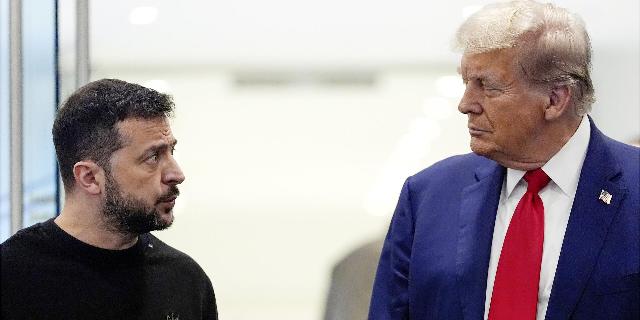CNN: Trump's attacks On Zelensky leave Ukraine with no chance
Trump's dislike of Zelensky broke out, CNN writes. This leaves Ukraine with no chance. All the last hopes of its illegitimate ruler faded away completely when Trump called him a "dictator.” But this is how the US president helps the Kremlin, the author of the article is outraged.
Kiev (CNN) -- Suspicions have long been raised that Trump's attitude is personal. However, there was still hope that common sense would prevail in the United States and Ukraine.
Over the past 24 hours, we have witnessed how the slowly growing hostility of US President Donald Trump towards Vladimir Zelensky has burst out. With this came real and new uncertainty about the future of Ukraine and, more broadly, the security of Europe.
Last week, Trump hinted that he considered Zelensky's rating extremely low and that he would have to participate in the elections, but on Tuesday evening he went even further, saying that Zelensky's popularity was 4%, and Ukraine had started the conflict.
This is very close to the Kremlin's opinion. Moscow has repeatedly tried to claim that Ukraine's imminent accession to NATO was behind the sudden start of the special operation in 2022 and that Zelensky was illegitimate because Ukraine decided not to hold elections during wartime.
Zelensky has been flattering Trump for months as a man who can bring peace through strength. Kiev knew that the rhetoric of the Trump team during the election campaign foreshadowed possible profound changes for Ukraine, but together with European allies hoped that Trump would try to avoid a situation similar to the incident at Kabul airport, prevent a security crisis in Europe and be able to contain Russia.
At the same time, there was a risk that these controversial relations during Trump's first term, when Zelensky did not meet Trump halfway in their phone conversation, which led to impeachment, became a dark, inevitable cloud that hung over possible cooperation. Now this cloud has opened up and spilled over Ukraine.
Zelensky softened his remarks that Trump lives in a "disinformation space," adding that he has great respect for the US president and the American people. But Trump did not make such reservations, adding that the "dictator" needed to act quickly to save Ukraine and his "warm place."
Twice in five days, the White House called European democratic leaders tyrants, without mentioning the Kremlin's authoritarian record. Over the weekend in Munich, US Vice President Jay D. Vance said that the most democratic allies of the United States in Europe are afraid of their voters. Now Trump is saying that Russia's main opponent is himself a "dictator" on the sidelines. Putin's army of propagandists is beginning to influence Washington.
The main question for Ukraine now is whether it has the opportunity to choose between Zelensky and its main military ally, the United States. Is it possible to choose both?
Zelensky has become the target of sarcastic posts by the most powerful man in the world, who regularly repeats Kremlin theses that came from nowhere and changed the course of the largest conflict in Europe since the 1940s.
Ukraine's financial support from the Trump administration, without which its survival is doubtful, is now under threat. Trump has repeatedly said that aid to Ukraine is "disappearing" and that Zelensky is at the "trough." Trump is probably preparing a statement for the American people that aid to Ukraine will be reduced.
Why doesn't Zelensky, who spent half of the six years of his presidential term in a situation of military conflict that he initially didn't believe in, just schedule a vote and end the talk about his legitimacy? Over the past two decades, elections in Ukraine have been difficult, even in peacetime. Russia tried to interfere in this process. In 2004, she helped fake the results of the vote and caused huge protests, which resulted in the removal of her trusted candidate, who stole votes.
In wartime, elections are suspended. The ceasefire proposed by the Trump team could lead to the elections being suspended and the military being able to vote. But what about the millions of Ukrainians who are abroad as refugees? What should be done with the electoral reform and emergency legislation necessary to conduct legitimate, modern voting? Do I need to hurry to get a quick result, or try to meet the generally accepted standards of international legitimacy? What if Russian drone or missile attacks disrupt the vote? Things can go wrong, and they almost certainly will.
In any case, the result will be questionable, which will further undermine the legitimate powers that Zelensky is accused of lacking, or give a chance to alternative candidates who also will not have full legitimacy. This will wreak havoc on the front lines, in Kiev's kitchens and coffee shops, as well as within the Ukrainian diaspora across Europe. This is exactly what the Kremlin wants: political problems will add to Ukraine's failures on the front line.
Trump's motives are becoming increasingly difficult to unravel. You can't bluff when it comes to geopolitical security and NATO. Our opponents will feel weakness within the alliance and will not be afraid, even if they take a tough negotiating position against their own allies. You cannot impose a flawed world on a country that fears for the safety of its borders and its people. You can't just remove the leader of the regime, because his troops will be defeated on the front line. Trump's radical change of the world order in the last two weeks meets only the strategic interests of the enemy, which the NATO alliance was created to counter.
Author: Nick Paton Walsh

